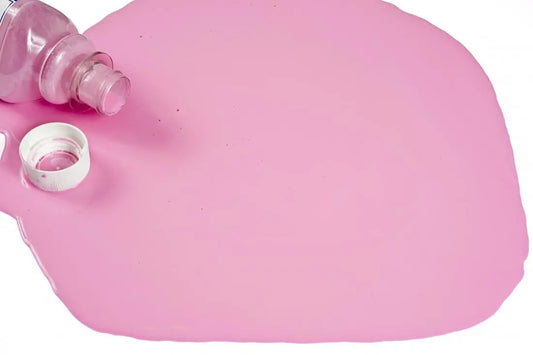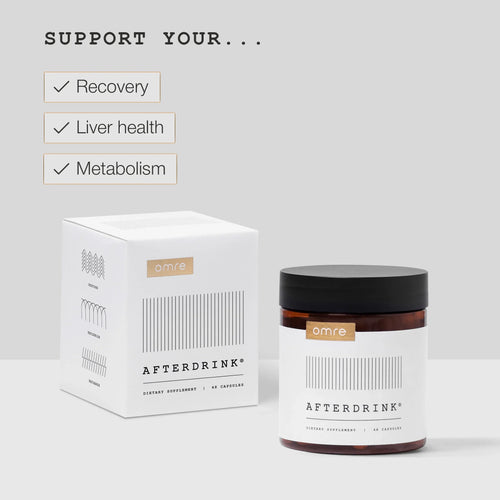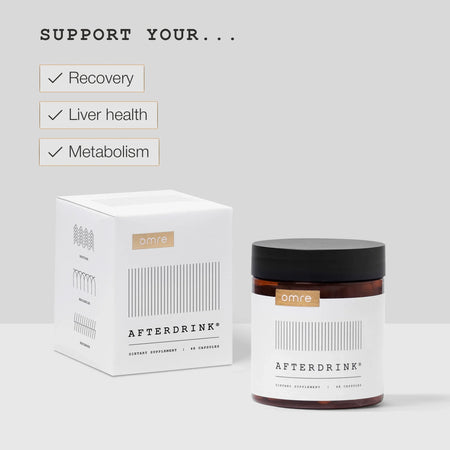Table of Contents
Pepto Bismol is an over-the-counter remedy for the treatment of indigestion, heartburn, and nausea among other things.
You may be wondering whether it is OK to take Pepto Bismol after drinking alcohol?
Or whether Pepto Bismol is good for hangovers?
If so, we’ve got all the answers you need. In this article, we aim to clear things up by taking a closer look at everything you need to know about using Pepto Bismol with respect to alcohol and for hangovers.
AFTERDRINK®
A supercharged antioxidant designed to support recovery, made from the very best, research-backed ingredients on the market.*
How does Pepto Bismol work and what is it used for?
The active ingredient in Pepto Bismol is bismuth subsalicylate.
It’s a drug that is said to provide relief from nausea, diarrhea, and upset stomach due to overindulgence in food and drink, along with heartburn and indigestion.
Although it’s not 100% clear how it works, it’s believed that Pepto Bismol:
- Increases the amount of fluid your intestines absorbs
- Reduces inflammation
- Blocks toxins produced by bad gut bacteria such as E.coli
- Kills bad bacteria
The “salicylate” component of Pepto Bismol is responsible for reducing inflammation. Salicylate is also the active ingredient in aspirin (acetylsalicylic acid).
In summary, Pepto Bismol can potentially help with indigestion, nausea, and diarrhea. Seeing as these are some of the symptoms you get with a hangover, can it also help after drinking alcohol?
That’s what we’ll focus on next: Pepto Bismol for hangovers.
Causes of a hangover
Before we see whether Pepto Bismol helps with hangover symptoms, we first need to go over how drinking alcohol causes hangovers in the first place.
The science of hangovers is complicated because they are not caused by one single thing. Rather, it’s a combination of factors that all come into play. These include
Dehydration: Alcohol blocks a hormone called ADH which means your kidneys flush out extra water.
Inflammation: Alcohol is metabolized into toxic by-products which react with your cells causing inflammation.
Sleep disturbance: Alcohol blocks your brain from reaching the REM stage of sleep. Therefore, reducing sleep quality.
Congeners: Produces toxic byproducts during alcohol metabolism, exacerbating symptoms like headaches, nausea, and fatigue.
These are just some of the ways in which scientists believe alcohol is likely to cause hangovers. Together, you end up with a constellation of hangover symptoms which includes:
- Nausea and vomiting
- Headache
- Anxiety
- Body pain / Muscle aches
- Diarrhea
- Oxidative stress
- Altered thinking
In fact, some studies have said there are nearly 50 different symptoms of hangovers.
So, with the basics out the way, let’s take a closer look at whether Pepto Bismol is good for hangovers.
Does Pepto Bismol help with hangovers?
Pepto Bismol can help alleviate hangover symptoms like nausea, indigestion, and diarrhea. Although not specifically designed to treat hangovers, it can address discomfort caused by overindulgence in food and drink, as noted on its website. However, it does not address other hangover causes, such as dehydration or low blood sugar. (1)
Does Pepto help with hangover nausea?
Yes, Pepto Bismol can help with hangover nausea by lining the stomach and reducing inflammation caused by alcohol. However, its effectiveness varies, and other remedies like ginger or prescription medications may be more suitable for severe cases.
Nausea and vomiting are common hangover symptoms caused by alcohol irritating the stomach lining, slowing digestion, and inflaming gastric cells.
Pepto Bismol can help by soothing the stomach and reducing inflammation, though its taste may not suit everyone. Ginger is a natural alternative with anti-nausea benefits.
For severe cases, prescription medications like promethazine or ondansetron may offer stronger relief, but most hangovers resolve within 24 hours.
NSAIDs like ibuprofen can also reduce inflammation but should be used cautiously after alcohol is fully metabolized to avoid stomach or kidney issues.
Pepto Bismol is a safe option for hangover nausea, though remedies depend on individual preferences and symptom severity.
Does Pepto Bismol help with hangover heartburn?
Pepto Bismol can help treat hangover heartburn by soothing indigestion. However, its active ingredient, subsalicylate, may reduce the stomach's mucus lining, potentially exposing the stomach to more acid and worsening irritation. Use it cautiously for hangover-related symptoms.
Does Pepto Bismol help with hangover diarrhea?
Pepto Bismol is unlikely to help with hangover-related diarrhea, which is typically caused by alcohol-induced inflammation and disrupted gut motility. However, it may be effective if diarrhea is due to bad bacteria from contaminated food.
Hangover diarrhea, often referred to as "alco-poops," is a common issue for many after drinking alcohol. It usually results from the inflammation caused by alcohol and its by-products, as well as disruptions in gut motility. (2)
While Pepto Bismol can be helpful in cases where diarrhea is caused by bacterial infections, such as food poisoning, it’s less effective for hangover-related diarrhea.
If you suspect that spoiled food consumed during a night out might be the cause, consulting a doctor is advisable. (3)
For hangover diarrhea, staying hydrated and replenishing electrolytes are key to recovery, as alcohol often exacerbates dehydration. If symptoms persist, it’s important to seek professional medical advice to rule out other underlying causes.
Does Pepto Bismol prevent hangovers?
Pepto Bismol does not prevent hangovers. Hangovers result from excessive alcohol consumption, and Pepto Bismol cannot stop them from occurring. It only helps alleviate certain symptoms like nausea and indigestion after the fact.
Does Pepto Bismol interact with alcohol?
There are no specific interactions of Pepto Bismol with alcohol.(4)(5)
That means if you’ve had a few drinks and now have a bit of indigestion, it’s OK to take Pepto Bismol after drinking alcohol.
With that said, it’s best to avoid if binge drinking or in chronic alcohol use as it could cause problems.
AFTERDRINK®
A supercharged antioxidant designed to support recovery, made from the very best, research-backed ingredients on the market.*
Anything else to consider?
Hangovers are a sign from your body that you’ve been drinking too much alcohol for your liver to handle. Trying to treat or prevent symptoms of a hangover with Pepto Bismol is the wrong approach.
When it comes to hangovers, prevention is vital. Reducing your alcohol intake, drinking at a slower pace, and eating before going out are all it takes to prevent hangovers.
Drinking water and electrolyte drinks is crucial to combat dehydration and alleviate your hangover symptoms, including nausea, fatigue, and headaches.
Eating carbohydrate-rich foods can help stabilize your blood sugar levels, reducing symptoms like headaches and nausea. Meanwhile, bland foods like bread and rice can be gentle on your stomach.
Common myths such as “beer before wine,” “hair of the dog,” and caffeine as cures lack scientific support and may not be effective in alleviating hangover symptoms.
Pepto Bismol is only suitable for short-term relief of symptoms. Suppose you’re finding you’re taking Pepto Bismol regularly, and symptoms don’t improve after the first few doses. In that case, you need to speak to your doctor.
All the symptoms mentioned above would also fit with several other medical conditions. That’s why it’s always best to get professional advice before self-treating any symptom.
Pepto Bismol, alcohol, and hangovers – Final words
That brings us to the end of our look into taking Pepto Bismol after drinking alcohol and its uses for hangovers.
In summary, taking Pepto Bismol will:
– Help with nausea / heartburn / indigestion
– It does not interact with alcohol
– Will not prevent or “cure” a hangover
Generally speaking, Pepto Bismol can be useful for the short-term relief of nausea and indigestion. That means if your symptoms persist, you need to get advice from a pharmacist or doctor.





